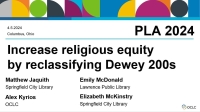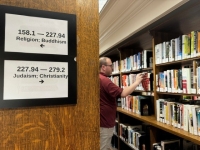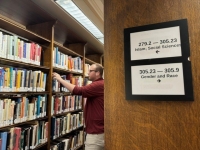Carrying the Torch for a Hidden Dewey Treasure
Springfield City Library
Innovation Synopsis
In 2022, Springfield City Library pioneered a more inclusive and logical approach to organizing religious materials by adopting OCLC’s optional Dewey 200s arrangement. This innovative classification system challenges traditional hierarchies and offers a more equitable representation of diverse faiths.
Recognizing the potential impact of this groundbreaking work, Springfield Library embarked on a nationwide outreach initiative in 2023 and 2024. Our librarians shared their expertise and experiences at conferences and libraries across the Northeast and beyond, including the Public Library Association conference in Ohio. Through these efforts, we've inspired countless libraries to adopt this inclusive model, fostering a growing movement to create more equitable and accessible collections that truly reflect our communities.
By sharing knowledge and best practices, we collectively advance the goal of libraries as inclusive spaces that serve all patrons.
Challenge/Opportunity
Springfield Library enthusiastically completed the reclassification of religious materials across its nine branches, but any mention to colleagues outside their library revealed a surprising lack of awareness about the OCLC-provided optional Dewey 200s arrangement. This valuable tool, quietly introduced in the 2019 Dewey blog, offered a clear path to enhance equity and accessibility within library collections, but was essentially unknown.
Springfield librarians knew from experience that this project was an opportunity with clearly defined parameters for libraries everywhere to “walk the talk” of increasing equity and access to their collection. They also believed that by increasing adoption rates, OCLC would be encouraged to make the optional arrangement the standard classification, benefiting both patrons and librarians by making equity and access the default in this area.
Key Elements of Innovation
The innovation was to humbly and fearlessly get on the road! Springfield librarians didn’t wait for a bigger library to do the work, they didn’t wait for a perfect implementation (Springfield’s had taken place over the course of the pandemic, so had its pitfalls), and didn’t wait for permission from OCLC to start championing the work.
They responded to a perfect intersection of needs:
*Libraries looking for ways to improve access and equity in their collections
*Libraries needing a shovel-ready project to implement their commitment to DEI made on paper, but less IRL
*OCLC’s theoretical work needing a champion to show what it looked like in practice
Achieved Outcomes
1. Provided direction and instruction on implementing the alternate arrangement to:
a. Statewide and regional conferences throughout 2022-2024, including:
NELA (New England)
NHLA (New Hampshire)
VLA (Vermont)
RILA (Rhode Island)
MLA (Maine)
CLA (Connecticut)
MLA (Massachusetts)
Simmons University MLIS program students
Vermont Technical Services Round Table
CWMARS (MA consortium) Cataloging Round Table
2. This outreach resulted in the completed or committed/planned adoption of the alternate arrangement in at least 31 libraries in New England.
3. Partnered with OCLC’s Dewey Editorial Team to:
Refine and enhance presentation developed locally
Presented together to hundreds of librarians at PLA in April of 2024
Plan an OCLC-sponsored worldwide presentation to over 1000 attendees in June 2024



